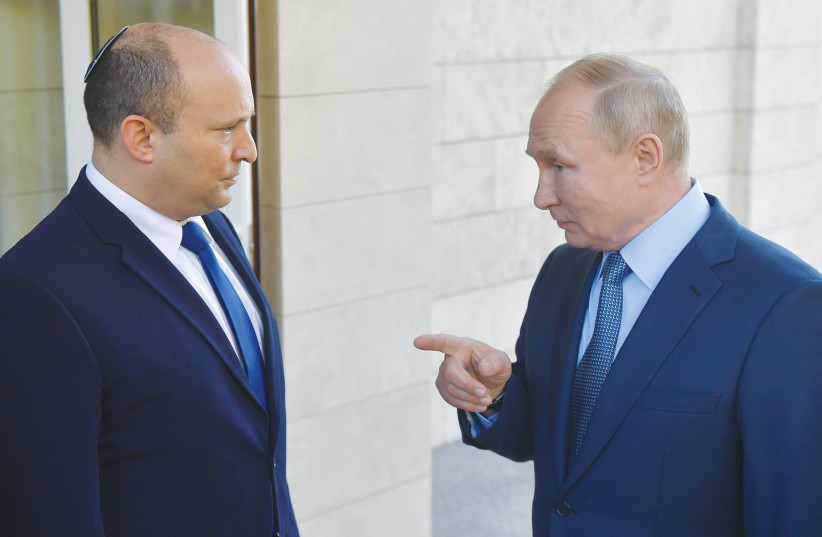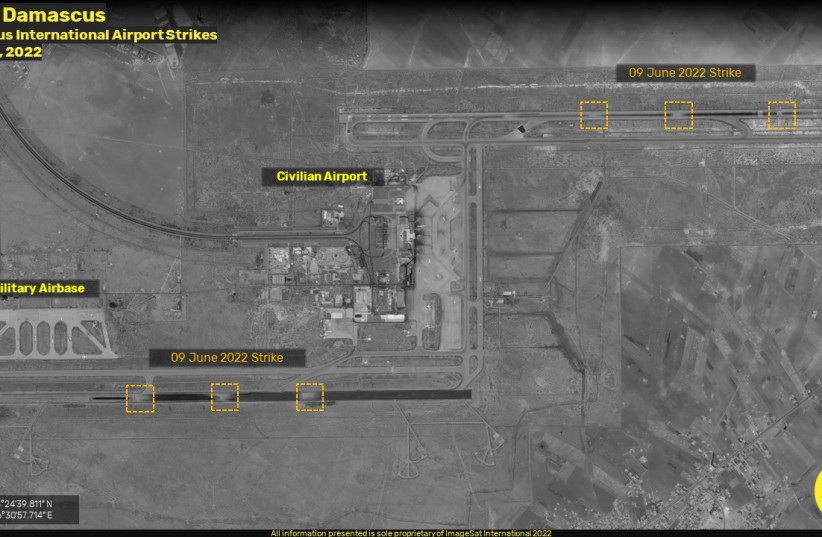Jerusalem has cited coordination with Moscow over Syria as a reason for not taking a more active role in helping Ukraine.

Russia has repeatedly lashed out at Israel in recent days, while Israel’s position on the Ukraine conflict has remained unchanged, despite being predicated on a good relationship between Jerusalem and Moscow.
The latest Russian move against Israel is to circulate a draft UN Security Council resolution condemning the bombing of the international airport in Damascus, which Russia has blamed on Israel.
The attack violates Syria’s sovereignty and undermines stability, Russia said in the draft, adding that the perpetrators must take responsibility, KAN News reported. The strike on the airport makes it much harder to send humanitarian aid to Syria, the draft said.
The resolution is highly unlikely to get the UNSC’s approval because the US, UK and France can veto it.
But it is one in a series of angry reactions from Moscow since the strike in Damascus on June 10, after which satellite images showed significant damage to the airport’s military and civilian runways, rendering them inoperable.

Russian Foreign Ministry spokeswoman Maria Zakharova condemned the airstrikes soon after, saying such actions put civilian airlines and civilians in danger.
Days later, Moscow formally reprimanded Ambassador to Russia Alex Ben-Zvi, and Deputy Foreign Minister Mikhail Bogdanov said he was not convinced by Israel’s explanations for the attack.
The series of events takes place as Israel has been reluctant to provide military aid to Ukraine following Russia’s invasion in late March.
Invasion of Ukraine
Israel voted to condemn Russia’s invasion of Ukraine at the UN in all votes in which it could participate, and Foreign Minister Yair Lapid has repeatedly spoken out against the war and accused Russia of war crimes. But Prime Minister Naftali Bennett has been quieter and has focused on expressing sadness at the loss of life. Meanwhile, Israel sent several planes loads of humanitarian aid and built a field hospital.
Once a wave of terrorism hit Israel in late March and April, Ukraine mostly fell off of the national agenda. Nevertheless, the Defense Ministry delivered protective gear to Ukraine and sent senior representatives to US-led meetings on supporting the country at war.
Jerusalem has cited coordination with Moscow over Syria, where the Russian Army has a major presence, as a reason for not taking a more active role in helping Ukraine, even though Kyiv has asked for aid.
Israel conducts strikes on Iranian targets and weapons convoys in Syria, and it has a deconfliction mechanism to avoid a confrontation with Russia.
As recently as last week, Bennett and his office have said a good relationship between Israel and Russia has helped maintain an effective channel of communication between the West and Russian President Vladimir Putin that should not be jeopardized. A source close to Bennett cited the opening of a humanitarian corridor to evacuate Ukrainians from Mariupol’s Azovstal iron and steel works in May as a positive result of Bennett’s continued contact with Putin.
At the time, a Kremlin statement said Bennett and Putin had discussed the humanitarian corridor, but a Ukrainian diplomatic source did not share the assessment that Israel played a major role.
In addition, when asked about the Bennett-Putin channel, an American diplomatic source last week was dismissive of the claim that it is helpful, adding that Putin has manipulated all of his Western interlocutors who attempted to stay in contact with him since he invaded Ukraine.
MEANWHILE, THERE have been heightened diplomatic tensions between Jerusalem and Moscow since the invasion of Ukraine, even as Israel has said it is trying to maintain the relationship.
Hours before the invasion, and while Israel was still totally silent on Ukraine, Russia took issue with Israeli sovereignty over the Golan Heights in a UNSC meeting. Though Russia recognized western Jerusalem as the capital of Israel in 2017, its ambassador to the UN appeared to roll that back in his remarks, expressing opposition to “Tel Aviv’s announced plans for expanding settlement activity in the occupied Golan Heights.”
In April, when Defense Minister Benny Gantz said Israel would send helmets and flak jackets to Ukraine, Russian Ambassador to Israel Anatoly Viktorov told Russian state TV his country would “respond accordingly.”
Putin also demanded in a letter to Bennett that Israel grant his country control of a church in Jerusalem, as the previous government promised. An Israeli court stopped the transfer in March.
The following month, Russian Foreign Minister Sergey Lavrov said Ukrainian President Volodymyr Zelensky commands “Nazi forces” and that “Adolf Hitler also had Jewish blood.”
Bennett and Lapid condemned the remarks, while the Foreign Ministry in Moscow doubled down. Days later, Bennett said Putin had apologized for the comments, but the Russian readout only said they discussed the Holocaust.
Viktorov participated in a Knesset meeting on May 10 marking Victory Day, celebrating the end of World War II, and walked out after lawmakers called Russia’s invasion of Ukraine a “slap in the face for our grandparents who fought the Nazis,” among other criticisms. Viktorov had prior engagements, and his departure was not related to the speeches, the Russian Embassy said at the time.
There have also been reports of Russian dissatisfaction at Israel moving in on the European energy market, following sanctions on Moscow. Israel, Egypt and the EU signed an agreement last week for the Europeans to import gas from the Eastern Mediterranean in the coming years.
At the same time, Western countries are not putting pressure on Israel to do more for Ukraine.
During her visit to Israel last week, European Commission President Ursula von der Leyen said Jerusalem was “help[ing] Ukraine with tons of humanitarian aid and a field hospital, and you have welcomed tens of thousands of Ukrainian refugees to your land.”
Washington understands the challenges Israel faces with Russia on its northern border, the American source said. The US is satisfied that Israel has responded positively to its requests regarding Ukraine, he also said, which echoes statements by US Secretary of State Antony Blinken during his visit to Israel in March. Blinken thanked Lapid for his strong repudiation of Russian aggression against Ukraine and the Israeli promise that Israel would not be used as a back door for sanctions violations.”
Blinken also said he was “thankful [for the] Israeli government’s efforts to provide humanitarian aid, including over 200 tons of medicine, food and other supplies… and the field hospital.”
Israel’s relatively quiet support for Ukraine does not seem to have jeopardized the deconfliction mechanism in Syria at this point – Bogdanov mentioned it as a way for Israel to clarify its position in his statement last week – but it is clearly putting a strain on the relations. Yet with Israel’s major Western allies apparently satisfied with Jerusalem’s position, it will likely stay the same, even as Russia tries to condemn Israel at the UN.
Content retrieved from: https://www.jpost.com/israel-news/article-709820.